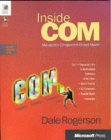Olivier Langlois's blog
Category: Windows programming
06/17/07
Effective COM: 50 ways to improve your COM and MTS based applications
This book borrow the format that made the Effective C++ popular. It presents 50 tips on COM. Its targeted audience is developers that have been using COM for a while. Prior knowledge of COM is expected for reading this book. In general, it provides very good tips but the only exception is the section about MTS. Maybe the tips are good but I do not know as I have never worked with MTS. That section contains 8 tips of the 50 tips of the book.
06/16/07

Categories: Windows programming, Windows programming
Understanding ActiveX and OLE
Usually, when I read a book on a programming technology, I expect to see some source code somewhere. This book is surprising in that regard because it only contains plain english from the first page to the last. There was a hint on the cover page by indicating that managers are included in the targeted audience. This feature has some merits but is also a pain at some other places.
When presenting software to programmers, the most straight to the point way to present the material, it is with source code and I feel that at some occasions, a function definition would have replaced pages of explanations. On the other hand, it is easy to get lost in pages of source code filled with error condition handling code where a simple paragraph of plain english would have been enough to communicate the general idea behind a software module.
With these remarks in mind, this is why, as a programmer, I did not like the first few chapters describing COM basics and really appreciated the last chapters covering OLE compound documents, ActiveX and the usage of COM by MS Internet Explorer.
06/15/07
Essential COM
I have learned a lot with this book. I would not qualify the book an introduction book because unless you have some background knowledge and practice, you are going to find the last chapters hard to digest. What the book does is to covers the essential principles of COM with great details. This will make the first reading very interesting and it will make you come back from time to time to seek back specific detail.
Inside COM
This book is probably the best COM introduction book for C++ programmers. It walks you through the basics such as the IUnknown and the IDispatch interfaces, the different types of COM servers and the threading models. Everything is explained in clear writing style.
06/13/07
ADO : Activex Data Objects
I have also read Programming ADO from David Sceppa and I prefer this one because it contains a lot examples with source code. My only complain is that there is only a small C++ program and the rest are all in Visual Basic. However, this is not a big issue as it is very easy to port the samples in C++.
Olivier Langlois's blog
I want you to find in this blog informations about C++ programming that I had a hard time to find in the first place on the web.
| Sun | Mon | Tue | Wed | Thu | Fri | Sat |
|---|---|---|---|---|---|---|
| << < | > >> | |||||
| 1 | 2 | 3 | 4 | 5 | ||
| 6 | 7 | 8 | 9 | 10 | 11 | 12 |
| 13 | 14 | 15 | 16 | 17 | 18 | 19 |
| 20 | 21 | 22 | 23 | 24 | 25 | 26 |
| 27 | 28 | 29 | 30 | 31 | ||
Search

Categories
Olivier Langlois's blog
- AAC (2)
- Book reviews (12)
- C++ (24)
- Code Optimization (4)
- Compiler (3)
- Fractal (2)
- Linux/UNIX (3)
- Multithreading (3)
- Software security (7)
- TCP/IP (8)
- Web (1)
- Windows programming (19)
- C++ (28)
- tutorials (4)
- General (10)
- Hardware reviews (2)
- Linux (12)
- Recommended books (4)
- C++ (20)
- Code Optimization (2)
- Compiler (3)
- Fractal (2)
- Linux/UNIX (1)
- Multithreading (2)
- Rare out of print (3)
- Software security (5)
- TCP/IP (7)
- Windows programming (16)
- Software reviews (0)
- TCP/IP (8)
- Video games (4)
Archives
- January 2016 (1)
- September 2015 (1)
- July 2015 (1)
- June 2015 (1)
- May 2015 (1)
- December 2013 (3)
- September 2013 (1)
- May 2013 (8)
- April 2013 (1)
- December 2010 (1)
- August 2010 (1)
- June 2010 (1)
- More...
Misc
 XML Feeds
XML Feeds
What is RSS?
Who's Online?
- Guest Users: 3
 BOOKS i'm reading
BOOKS i'm reading







